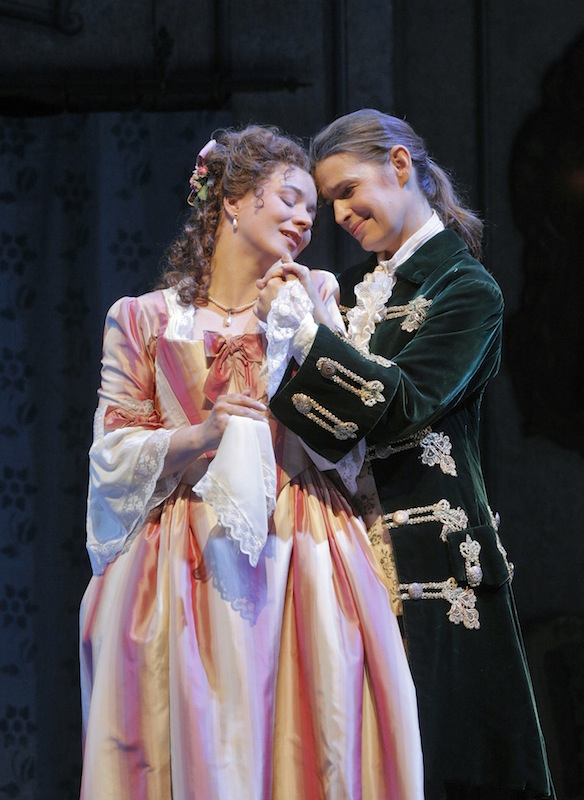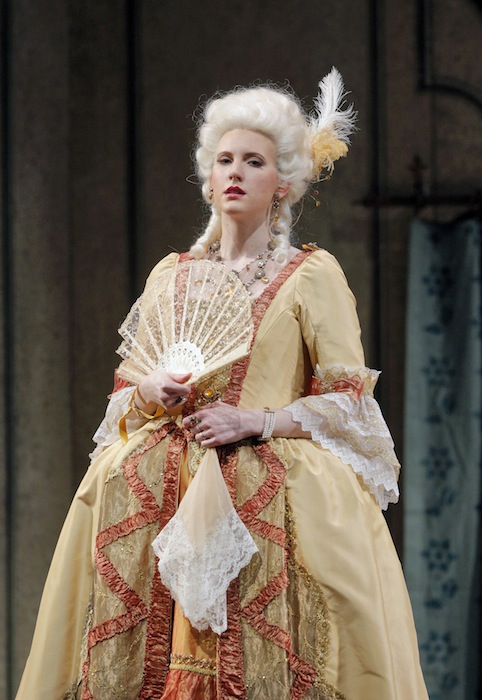Lyric Opera voices soar gloriously in Strauss’s “Rosenkavalier”

Christina Landshamer and Sophie Koch in Richard Strauss’s “Der Rosenkavalier” at Lyric Opera. Photo: Cory Weaver
In the 105 years since the instant success of Der Rosenkavalier at its Dresden world premiere, the world has changed in ways that can make Richard Strauss’s opera seem much more dated than the Mozart works that inspired it.
The popularity of Strauss’s uber-Viennese comedy of romantic manners appears to have waned somewhat in recent decades, with the two edgier Strauss operas that preceded it–Salome and Elektra–seemingly more in synch with today’s darker, more pessimistic era. Perhaps that’s also due to audiences’ decreased attention spans for an opera that runs over four hours with intermissions.
The great strength of Lyric Opera’s terrific production of Rosenkavalier, which opened Monday night at the Civic Opera House, is that it gets all the important things right: three first-class women singers in the principal roles, an outstanding house debut by conductor Edward Gardner and a traditional staging that takes Strauss’s opera on its own terms.
Set in mid-18th-century Vienna, Der Rosenkavalier depicts the affair between the wealthy married Marschallin Marie-Therese and her 17-year-old lover Octavian. Difficulties ensue when the woman’s nouveau-riche cousin Baron Ochs asks Octavian to be the official bearer of an engagement silver rose to his young fiancee, Sophie. Unfortunately, in doing so the boy falls in love with Sophie himself. Angered by Ochs’ gross behavior towards then girl, Octavian wounds him in a duel, and the scene is set for a finale in which Ochs is pranked and gets his comeuppance. Octavian, with regrets, leaves the Marschallin for the more age-appropriate Sophie in a bittersweet coda.
Strauss had a lifelong love of the female voice and the operas of Mozart and drew on both in Rosenkavalier. The surface high-jinks rest on the declasse Ochs and the gender-bending trousers role of Octavian–a woman portraying a teenage boy who then masquerades as a woman. Yet there is an underlying melancholy in the opera as the Marschallin–an “older woman” in her early 30s–muses on the temporal nature of life and love, as well as the necessity of ceding her young lover.
The length of Rosenkavalier can be a haul with Lyric’s performance clocking in at four hours and ten minutes, including two long intermissions (box lunches are available in the Civic Opera House lobby). But the big moments are worth the wait and among Strauss’s most inspired music, including Octavian’s presentation of the silver rose in Act II and the celebrated final trio.
If the comedy was rather hit and miss opening night, the deeper waters of the inexorable passing of time–as reflected by the wistful, clocklike descending notes that recur throughout the opera–was consistently manifest. Most of all the myriad vocal glories of Strauss’s score were well served by a well-cast trio of women in the principal roles.
Sophie Koch made a fine Lyric Opera debut as Charlotte in Massenet’s Werther three seasons ago, a bow that was largely lost amid a disastrous postmodern production.
The French mezzo-soprano is heard to much better advantage as the young cavalier Octavian, who is really the opera’s central character. Koch’s experience in this, her signature role, was consistently manifest. With her gangling movements and man-spreading body language Koch was wholly believable as the impetuous teen lover, and genuinely funny in her masquerades as the maid Mariandel, who becomes the object of Ochs’ misplaced affections.
Vocally, the French mezzo was in glorious form, singing with agility and striking richness of tone and blending beautifully with her two colleagues in the soaring final trio.
In the role of the Marschallin, Amanda Majeski was largely successful, rebounding nicely from her cartoonish Countess in the crass, misconceived Marriage of Figaro that opened Lyric’s season last fall.
Majeski’s acting can be inconsistent and, as the Field Marshal’s elegant wife, her regal bearing was a sometime thing. Vocally, however Majeski was exemplary, riding Strauss’s long lines with gleaming tone and confidence. She brought a dignified sadness to her long Act I soliloquy musing on her fading beauty with touching expression. The soprano was ideally poised and affecting vocally and dramatically in the final trio as she yields her young lover to a woman his own age.
Making her Lyric debut, Christina Landshamer seemed ill at ease in her opening moments as Sophie, the innocent bride about to be sacrificed to the brutish Ochs. If the German soprano’s rather blank acting didn’t bring much winsome charm to the role, her soubrette voice proved ideal with a bright youthful quality and ease in the high tessitura.
The wild card among the principals was Matthew Rose as Ochs, making both his Lyric and role debuts. The part of the Marschallin’s gauche cousin is often taken by late-middle-aged singers but the 37-year-old British bass is more age-appropriate to what Strauss requested.
Rose has the weighty voice and low notes for the role of the Marschallin’s social-climbing cousin intent on wedding the innocent Sophie. He mostly eschewed the standard buffoonery, which was a welcome change, though at times he shortchanged the role’s comic potential in the process, the towering bass making an Ochs too often more menacing than humorous.
The San Francisco Opera production is not the most visually sumptuous Rosenkavalier one will ever see but Thierry Bosquet’s traditional sets and costumes are effective enough, and Duane Schuler’s artful lighting skillfully hides their shelf-life.
Among the challenges in staging this opera are the logistics of the huge supporting cast and ensemble scenes, full of supernumeraries and extras. All were handled seamlessly under the fluent and graceful direction of Martina Weber, in a notably successful company debut.
It was luxury casting indeed to have Rene Barbera as the Italian Singer. The former Ryan Opera Center member delivered his aria (“Di rigori armato”) in warm-toned Neapolitan style, with a fine bit of tenorial temperament thrown in.
As Faninal, Ochs’ equally devious potential father-in-law, Martin Gantner was aptly blustery as the parvenu happy to marry off his unwilling daughter for social and financial advancement.
Rodell Rosel and Megan Marino were a characterful duo as Valzacchi and Annina, if at times over the top in their antics as the parasitic, double-dealing schemers. Laura Wilde as Marianne, Mingjie Lei as the Marschallin’s Major-Domo, Philip Kraus as the Notary and Patrick Guetti as the Police Commissioner all lent assured and colorful support among the large cast.
Conductor Edward Gardner made a most impressive house debut. Former music director of English National Opera, the British conductor showed himself a Straussian of the first order, pointing the waltz rhythms affectionately, closely following the stage action, and drawing out the quicksilver wit and lush lyricism of Strauss’s score.
A couple fleeting ensemble slips apart, the Lyric Opera Orchestra performed at its peak Monday night with polished and idiomatic playing across all sections. Concertmaster Robert Handford’s violin solos provided consistent pleasure–elegant, shimmering and fully in Viennese style.
The only blot on an otherwise faultless evening was a technical one. The surtitles became grievously out of synch with the stage action halfway through Act II and stayed that way until the end of the scene, also vanishing during the final trio. A Lyric spokeswoman said that the person in charge became suddenly indisposed, and an inexperienced hand had to take over. But shouldn’t there be a backup plan in place for unexpected events like this?
During the first intermission of these Rosenkavalier performances, the company is doing an open set change from the Marschallin’s boudoir to the Faninal palace. Engagingly hosted and narrated by stage manager John W. Coleman–with a timely pitch for Lyric’s backstage tours–it made a nice behind-the-scenes bonus to a long yet enjoyable evening.
Der Rosenkavalier runs through March 13. Alice Coote sings the role of Octavian in the March performances. lyricopera.org; 312-827-5600.

Posted Feb 14, 2016 at 4:44 pm by Robert
Agree with the review. Subtitle issues existed on Saturday’s performance as well – a pitiful distraction from an otherwise excellent production.